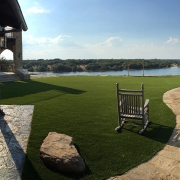The Case for Artificial Turf
[vc_row][vc_column width=”1/1″][vc_single_image image=”251″ border_color=”grey” img_link_target=”_self” img_size=”full”][dt_gap height=”15″][dt_fancy_separator separator_style=”dotted” separator_color=”accent” el_width=”100″][dt_gap height=”5″][vc_column_text]
Artificial turf has long been used for sports fields (football, rugby, golf, field hockey) and lawns. Plastic turf is great for the places in your yard where you cannot grow grass. These may include paths, terraces, and areas around the pool, which are often laid with concrete or gravel. Artificial turf is much more attractive and lightweight than concrete or gravel. Just like concrete, it can be washed or swiped; in contrast to concrete, it is softer and looks much more natural.
Artificial turf varies by its “sward” length – the tallest is the “grass” for rugby fields, and the lowest is the “grass” for lawns. The turf’s fiber can be monofilament, fibrillated, and combined. Monofilament turf has individual fibers of varying height and width, joined together in bundles. This type of turf is long-lasting and similar in appearance to natural lawns. Fibrillated turf has larger fibers formed in a grid. Combined turfs are a mix of monofilament and fibrillated fibers.
By materials, artificial turf is divided into 3 main groups: polypropylene, polyamide, and polyethylene. Polypropylene is used for sports fields and lawns. Polyamide is used for lawns and gardens; this synthetic turf needs to be irrigated with water. Polyethylene is the most popular new type of material, which is used for sports fields and gardens. It is very strong and durable.
Artificial turf has a number of specific advantages in comparison to grass lawns. Firstly, it provides for unlimited hours of use in sports fields. Artificial turf can withstand most weather extremes, so it can be used year-round. Natural lawns cannot be used for more than 200 hours a year, as well as they cannot be used at low temperatures and after a snowfall. Secondly, artificial turf costs less and is easier to lay and maintain than natural lawns. It does not need mowing, fertilizers, or frequent replacement. Lastly, synthetic turf lasts longer than natural. The estimated lifetime of artificial lawns is 5 to 10 years, depending on the structure and composition.
Modern artificial turf is sold in 1-2 meter wide rolls; its cost is similar to regular carpets. Some types of synthetic turf have a very natural look, while others look quite dissimilar to authentic grass. Therefore, before you purchase, you may want to obtain a few samples and compare them to each other.
Once you have chosen and bought the turf, you need to prepare the site for its installation. The surface area must be flat, firm and dry. Some guides advise to roll the turf out, while others state that it’s best to glue it. A synthetic surface is easily cut with scissors. Artificial turf will never look like grass, and it’s not a substitute for grass. Many gardeners like to think of it as a substitute for concrete or gravel

